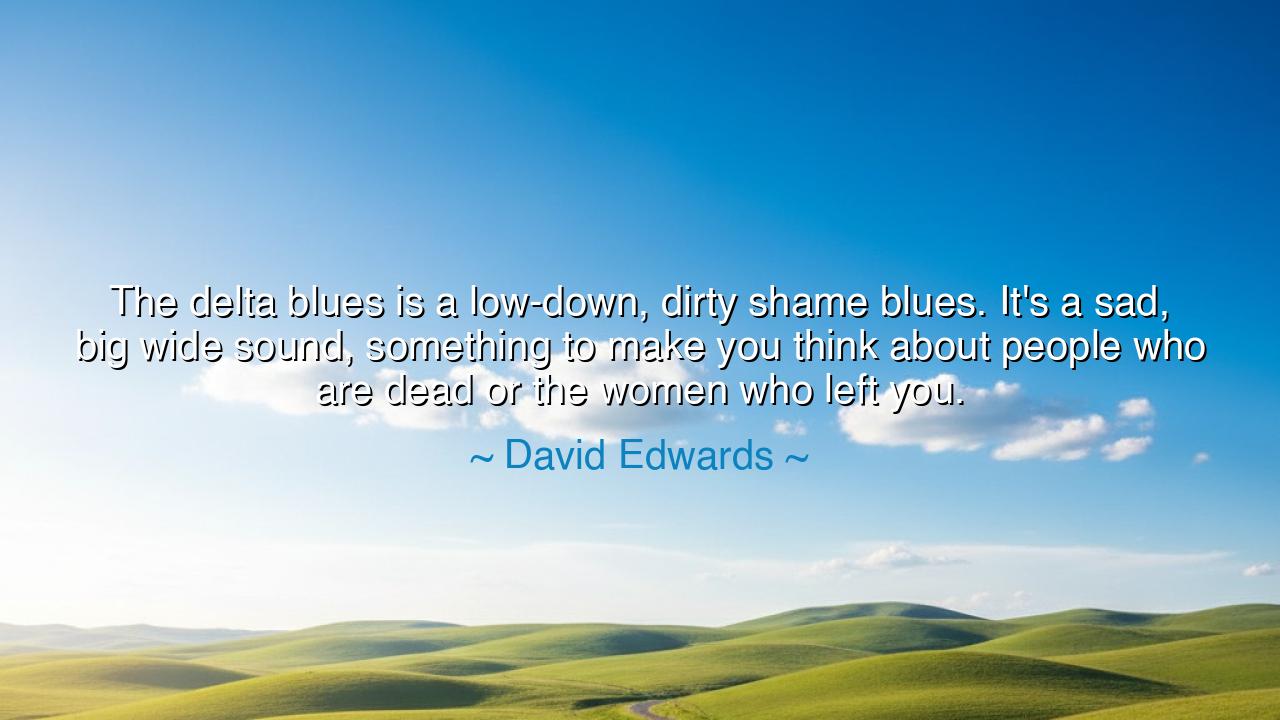
The delta blues is a low-down, dirty shame blues. It's a sad, big
The delta blues is a low-down, dirty shame blues. It's a sad, big wide sound, something to make you think about people who are dead or the women who left you.






Hear the words of David Edwards, spoken like a lament carried by a guitar string: “The delta blues is a low-down, dirty shame blues. It’s a sad, big wide sound, something to make you think about people who are dead or the women who left you.” In these words, he gives voice to the very spirit of the blues, a music born not of comfort or luxury, but of pain, loss, and survival. It is the cry of the soul when all else is stripped away, when joy is fleeting and sorrow is heavy, and yet one still finds a way to sing.
The Delta Blues, rooted in the fields and rivers of Mississippi, arose from the suffering of a people scarred by slavery, poverty, and oppression. Its sound is raw, unpolished, and heavy with grief, yet also strangely liberating. Edwards calls it “low-down, dirty shame blues” because it does not disguise sorrow; it lays it bare. In the wide sound of a slide guitar or the haunting drawl of a voice, one hears not just the story of one man, but of generations. The music itself becomes a mirror of human anguish, a reminder that pain unspoken will consume us, but pain sung aloud becomes something almost holy.
The ancients knew the same truth, though they named it differently. In the tragedies of Greece, sorrow was sung upon the stage so that the people might feel it together, purging their grief through collective lament. Just as audiences wept for Oedipus or Antigone, so too did the first listeners of the Delta Blues weep for lost loves and absent fathers, for the weight of death and despair. Both forms, though separated by centuries, show that mankind has always turned suffering into ritual, transforming despair into song.
History offers us countless examples. Consider Robert Johnson, whose songs like Hellhound on My Trail or Love in Vain captured both the sorrow of personal loss and the weight of ancestral grief. When Johnson sang of betrayal or death, it was not mere entertainment—it was testimony, a sermon of suffering wrapped in music. Like Edwards, he reminded us that the blues forces us to look directly at life’s hardest truths: the inevitability of death, the pain of abandonment, the loneliness that comes when those we love depart.
Yet within the sadness of the blues lies a strange paradox: it comforts even as it mourns. Edwards himself knew that by singing of dead loved ones or women who left, one gave form to grief, and in that form, there was release. The blues teaches us that sorrow can be endured if it is expressed, that one’s pain, when shared in song, becomes bearable. The “big wide sound” he describes is the sound of a soul unburdening itself, inviting others to share in its weight so that no one must carry it alone.
The lesson for us is eternal: do not hide your sorrow, for unspoken grief becomes a poison. Instead, give it voice—through music, through words, through art. Let your pain, like the delta blues, echo into the world, not to spread despair but to remind others that they, too, are not alone in their suffering. In doing so, you transform shame into strength, isolation into connection, and sorrow into beauty.
So let Edwards’s words guide us: when sorrow comes, do not silence it. Sing it, speak it, write it, paint it. Whether your grief is for the dead or for the love who left, let it become a song. For in the song, as in the delta blues, sorrow finds dignity, memory becomes sacred, and the soul, though battered, rises with a strength it did not know it had. This is the power of the blues, and the eternal wisdom it carries for all who suffer and yet endure.






AAdministratorAdministrator
Welcome, honored guests. Please leave a comment, we will respond soon